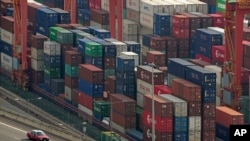Officials from developed democracies are becoming increasingly vocal about Beijing’s use of trade barriers in political disputes.
On May 20, leaders of the Group of Seven (G7) announced an initiative dubbed the Coordination Platform on Economic Coercion. The move is aimed at countering economic coercion, including by China.
“The world has encountered a disturbing rise in incidents of economic coercion that seek to exploit economic vulnerabilities and dependencies ... With a view to enabling sustainable economic relations with China, and strengthening the international trading system … we will foster resilience to economic coercion,” the G7 leaders said in a joint communique released on the second day of the G7 summit in Japan.
China’s state-run Global Times newspaper slammed the statement, saying China does not engage in such activities.
“As a matter of fact … 'China never wages tariff wars or groundlessly hobbles any foreign companies', China's Foreign Ministry said recently. To claim China [is] engaging in the so-called 'economic coercion' is no more than lodging trumped-up charges, and the accusation is totally untenable,” Global Times said in an article published on May 21.
That is false.
China’s increasing use of economic coercion has been manifested in various forms of pressure Beijing systematically imposes on businesses it targets in pursuit of foreign policy goals.
The German Marshall Fund, an American public policy think tank, defines economic coercion as “the use of commercial, financial, or other economic tools and resources for foreign political purposes, including to establish dependencies that influence foreign governments, entities, or individuals.”
China is currently the top trading partner of more than 120 countries, giving Beijing leverage against those that want access to its large market.
The Australian Strategic Policy Institute said in a report released this past February that coercive actions have become “a key part of the PRC’s toolkit” as it takes a more assertive position in international disputes and seeks to reshape the global order in its favor. (PRC is the abbreviation for the People’s Republic of China)
The institute’s report, titled “Countering China’s Coercive Diplomacy,” stated that between 2020 and 2022, China targeted 19 countries plus the EU with various forms of economic pressure, including trade restrictions, investment barriers, tourism restrictions, boycotts, cyber attacks and sanctions on individuals.
Such economic coercion targeted countries that engage with Taiwan, oppose China’s maritime claims regarding the South China Sea, criticize China’s oppression in Xinjiang and Tibet, or cross other political redlines for Beijing.
The European Council on Foreign Relations said in a 2022 report that China’s economic coercion against Europe was “on a deeply worrying trajectory.”
A March 2023 report by the Washington-based Center for Strategic and International Studies analyzed eight cases of Chinese economic coercion since 2010. It concluded that “the most salient characteristic of China’s economic coercion is that it simply is not very effective.” Still, the report indicated that as China has grown economically, so, too, has its propensity to engage in economic coercion against other nations.
Here are some recent examples of China’s economic coercion activities:
U.S.: Micron Technology (2023)
As The Wall Street Journal reported back in 2018, China has increasingly been using advanced chips to conduct surveillance on its citizens.
In October 2022, the U.S. Commerce Department’s Bureau of Industry and Security announced new measures it said would “restrict the People’s Republic of China’s ability to both purchase and manufacture certain high-end chips used in military applications.”
On May 20, the G7 announced an allied position on protecting dual use technologies from falling into the hands of strategic rivals.
The following day, May 21, China announced it would ban products made by U.S. memory chip giant Micron Technology, citing serious network security risks. The move is widely seen as retaliation for Washington’s efforts to restrict Beijing’s access to key technology.
Ukraine: COVID-19 Vaccines (2021)
In June 2021, Ukraine withdrew its support for a call to allow independent international observers into China’s western region of Xinjiang, after China threatened to withhold COVID-19 vaccines destined for Ukraine.
According to The Associated Press, Beijing threatened to block a planned shipment of at least half a million doses of COVID-19 vaccines.
China denied it pressured Ukraine over this matter. Still, after Kyiv withdrew its support for the proposal on Xinjiang, the two sides reached an agreement under which China indicated it was prepared to lend Ukraine up to $1 billion to finance road construction projects.
Lithuania: Taiwanese Representative Office (2021-2022)
In November 2021, Lithuania opened a “Taiwanese Representative Office” in Vilnius, its capital. Beijing saw the choice of the word “Taiwan” instead of “Taipei” as a serious violation of its One China Principle, according to which Beijing sees Taiwan as one of its provinces.
According to the New York-based Council on Foreign Relations, after the Taiwanese Representative Office opened in Vilnius on November 18, 2021, Chinese customer data showed a 90% drop in shipments of goods from Lithuania in December 2021, compared to the same period the previous year.
By early 2022, about 60 Lithuanian companies said they were facing problems caused by China’s unofficial sanctions. According to the Lithuania Confederation of Industrialists, a major industry group, more than 1,200 containers of goods, worth an estimated $260 million, were not coming to Vilnius.
Beijing later started to target firms in other countries that sourced Lithuanian products. Some German automakers that sourced automotive parts from Vilnius later found themselves unable to clear customs in China.
Australia: Cancellation of Belt and Road Projects (2021)
In April 2021, Australia’s foreign minister Marise Payne canceled two deals under the Belt and Road Initiative, or BRI, Beijing’s $1 trillion trade and diplomatic program to connect Eurasia and Africa with Chinese-built infrastructure projects.
Payne said the agreements were “inconsistent with Australia’s foreign policy or adverse to our foreign relations.”
As a result, Sino-Australia ties, which were strained in 2018 when Canberra became the first country to ban Chinese tech giant Huawei from its 5G network, dipped further, with Beijing indefinitely suspending activities under the bilateral Australia Strategic Economic Dialogue.






